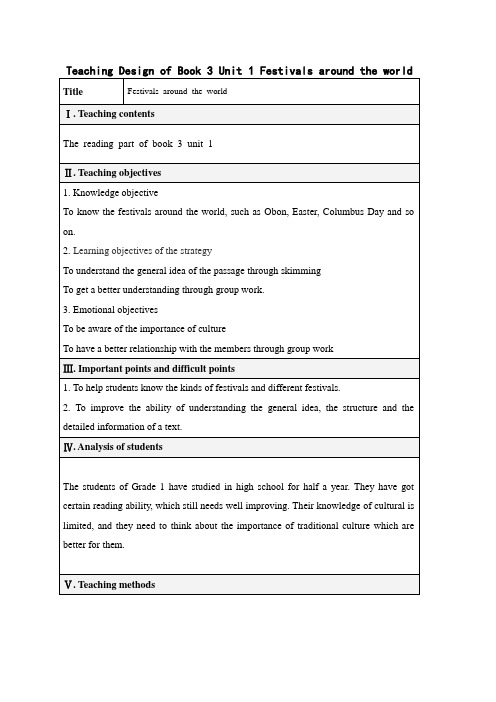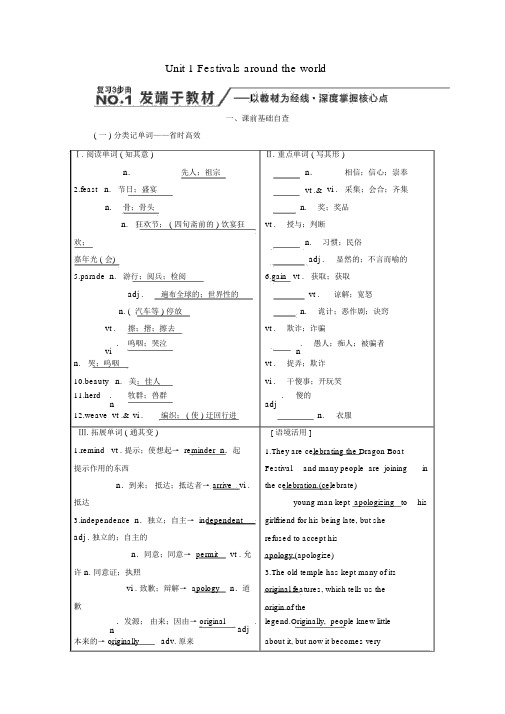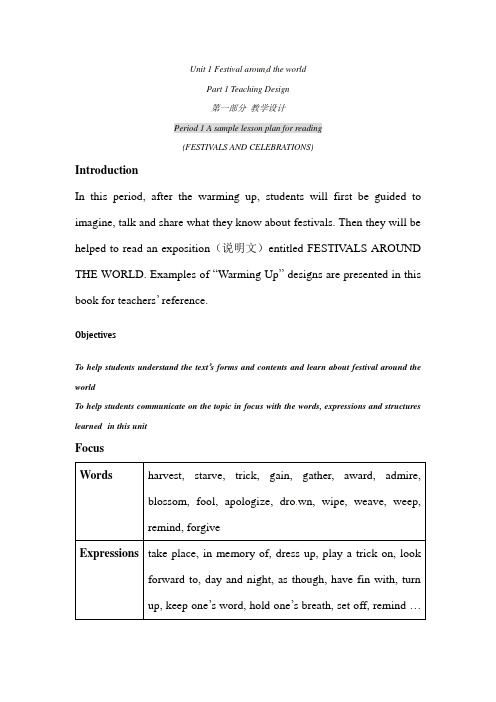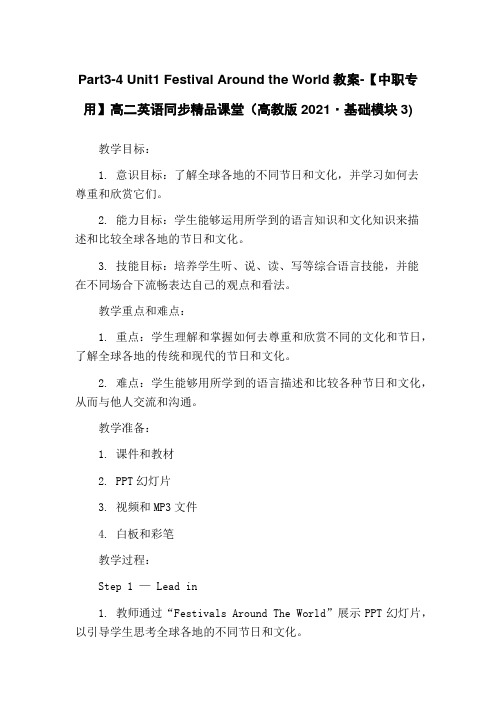高二英语:Festival around the world教学设计
Festivals around the world教案

The studentsofGrade1have studied in high school for half a year. They have got certain reading ability, which still needs well improving. Their knowledge of cultural is limited, and they need to think about the importance of traditional culture which are better for them.
Ⅱ.Fast reading
1. The main idea
2. The structure
Find the main idea by skimming and have a discussion to find out the structure.
This section is designed to train students’guess skills and fast reading skills. The discussion among groups caninspirestudents’interest.
To get a better understanding through group work.
3. Emotional objectives
To be aware of the importance of culture
To havea better relationship with the members through group work
Teaching Design of Book 3 Unit 1 Festivals around the world
高考英语复习Unit1Festivalsaroundtheworld教案

Unit 1 Festivals around the world一、课前基础自查( 一 ) 分类记单词——省时高效Ⅰ. 阅读单词 ( 知其意 ) Ⅱ. 重点单词 ( 写其形 )n.先人;祖宗n.相信;信心;崇奉2.feast n. 节日;盛宴vt .& vi .采集;会合;齐集n. 骨;骨头n. 奖;奖品n.狂欢节;(四旬斋前的)饮宴狂vt . 授与;判断欢;n. 习惯;民俗嘉年光 ( 会) adj . 显然的;不言而喻的5.parade n. 游行;阅兵;检阅 6.gain vt . 获取;获取adj . 遍布全球的;世界性的vt . 谅解;宽怒n. (汽车等)停放n. 诡计;恶作剧;诀窍vt . 擦;揩;擦去vt . 欺诈;诈骗vi . 呜咽;哭泣. 愚人;痴人;被骗者nn.哭;呜咽vt . 捉弄;欺诈10.beauty n. 美;佳人vi . 干傻事;开玩笑11.herd . 牧群;兽群adj . 傻的n12.weave vt .& vi . 编织; ( 使 ) 迂回行进n. 衣服Ⅲ. 拓展单词 ( 通其变 ) [ 语境活用 ]1.remind vt . 提示;使想起→ reminder n.起 1.They are celebrating the Dragon Boat提示作用的东西Festival and many people are joining in n.到来;抵达;抵达者→arrive vi . the celebration.(celebrate)抵达young man kept apologizing to his 3.independence n.独立;自主→ independent girlfriend for his being late, but sheadj .独立的;自主的refused to accept hisn.同意;同意→permit vt .允apology.(apologize)许 n.同意证;执照 3.The old temple has kept many of its vi .致歉;辩解→apology n.道original features, which tells us the歉origin of the.发源;由来;因由→ originaladj . legend.Originally,_people knew littlen本来的→ originally adv.原来about it, but now it becomes veryvi .& vt .( 使 ) 饿死;饿得要死famous.(origin)→ starvation n.饿死 4.The moment I saw the scientist admired n.庆祝;庆祝→celebrate v.庆by everyone, words failed to express my 祝;庆祝admiration.(admire)adj .充满活力的;精力充足的; 5.Even if you have a permit,_I won't踊跃的→ energy n.能量;精力permit you to enter the hall without my n.悲痛;悲伤→sad adj .悲伤的permission.(permit)→ sadly adv. 悲伤地;悲伤地 6.Della's eyes were full of sadness atn.农业;农艺;农学the sad news and she looked sadly at her → agricultural adj .农业的;农艺的husband.(sad)vt .赞叹;敬佩;敬羡→admiration 7.After three days without food, the men n.敬重;敬佩;敬羡we had comelater, they would have starved todeath.(starve)( 二 ) 练中记短语——记牢用活写准记牢语境活用 ( 采纳左栏短语填空 )发生 1.Great changes have taken_place in this mountain 纪念;追忆area in the past few years.穿上盛装;妆扮;装修 2.It is universally known that搞恶作剧;开playing_a_trick_on the disabled is an impolite玩笑;诈骗behavior.希望;期望; 3.In order to get ready for the examination, the期望students are studying day_and_night.日夜;日夜;整 4.If you want to make friends with others, you天must keep_your_word.出现;列席 5.At the play, Mr.Green dressed_up as a policeman8.keep_one's_word守信誉;执行with dark glasses.誓言 6.We will build a monument in_memory_of the9.hold_one's_breath屏息;屏气persons who sacrificed their lives for our玩得高兴country.出发;起程;使爆炸7.Miss Yang promised to attend my birthday party, 12.remind_...of_... 使想but she hasn't turned_up so far.起8.After saying goodbye to their friends, theyset_off for home.( 三 ) 仿写明句式——以用为本教材原句句式解读句式仿写1.At that time people wouldstarve if food was difficult 就我个人而言,这道数学题很难算to find, especially during the“主语+ be+adj .出来。
高中英语Unit1《Festivalaroundtheworld》教案新人教版必修3.docx

Unit 1 Festival around the world第一部分《金色教案》教学设计说明About the本单元以节日为话题,介绍了世界各地的一些节日的含义、由来和民俗。
topic and通过本单元的学习,可以帮助学生更多地了解节日、体味文化;同时又可the以引导学生理解、尊重不同的文化和习俗。
structures本单元语言功能项目是:打电话、邀请和致谢。
单元话题和本单元语言结构项目是“情态动词” 。
结构本单元还要求学生学习写作“记叙文:故事”。
《金色教案》教学设计在单元课时划分上与课本保持一致,即“阅读课、知识课、运用课三课时 / 三课型划分”。
但在实际教学过程中,建议教师依据学生基础、教学条件、学校安排的因素,对课本、对《金色教案》教学设计重新划分课时,裁剪、拼接使用提供的材料,以便“物尽所用”,达到最佳教学效果。
教师也可以参照《金色教案》提供的“实际教学过程课时划分建议”进行教学。
Period 1Warming Up 教师选择使用提供的“讨论”、“看听”或者“词汇学习” ,进Reading行热身,激发学生的阅读兴趣,导入本课,为 Reading 部分的阅读做好铺阅读课垫。
Pre-reading既可以让学生“想象和分享” ,也可以让他们“交谈和分享” 。
Reading通过 Listening to the recording,Reading and underlining。
Reading and transferring information, Retelling the text ,Readingand filling, Answering comprehension questions, Reading andunderstand ing difficult sentences和 Closing down by doingexercises活动,引导学生从形式到内容掌握课文,了解亡灵节、名人节、丰收节和春节,弄清楚节日的由来及其存在的意义。
高中英语(Unit 1 Festivals around the world)教案

英语教学设计Unit 1 Festivals around the world难点:情景对话二、教学目标1、知识目标:1). 通过阅读课文的学习进一步了解世界各国各种节日的基本知识。
2). 认识节日的分类、节日对人们生活的影响,从更深入的层面理解各国节日的意义。
3). 学习有关节日和民俗的词汇。
2.能力目标:1)听:能接听,知道语言。
2)说:能在中进行交流。
3)读:学习掌握跳读、略读、细读、概括和分析等阅读技能,掌握语言的内容。
3.情感目标:1).通过设计一些情景或提供各种图片,激发学生的学习兴趣,在英语情景学习和讨论中使学生的情感得到充分的体现;在课堂教学中突出了以学生为主体的学习地位,充分发挥学生的个性,培养了学生的创造力和想象力。
2).通过阅读课文,分析和挖掘课文中人物的思想感情,使学生树立起正确的审美观、人生观和价值观。
4.教学策略:1).开放式教学策略。
以有限的课堂为载体,给学生提供足够的空间,充分发挥学生的想象力,培养学生的创新能力.如:brainstorm, role playing, given situation, acting 等活动。
2).任务型活动策略。
在做中学和练,任务明确,活动面广,使学生在交际中真实运用所学知识。
3). 循序渐进和梯度分明的教学策略。
教学活动由易到难,由简到繁,给有困难的学生搭建一个平台,让学习有能力的学生“跳一跳”摘到果子。
5.学习策略:1).在学习中借助联想,根据情景等非语言信息进行理解和表达。
2).在听、读过程中,能根据情景和上下文猜测词义或推测每一幕的大意。
3).能根据所接触语言材料中的语言规律加以总结和归纳。
6.文化意识:1).学习和了解中外节假日。
2).通过学习、分析世界节假日形成的原因。
3).通过中外节假日的对比,加深对中国节假日的理解。
三、教学原则1.以任务型教学作为课堂教学的设计理念,强调教学方法的灵活性和多样性。
具体采用情景教学法(Situational Approach)、整体语言教学法(Whole Language Teaching)和交际法(municative Approach)等教学方法,学习者通过自学、讨论、交流、询问、演练等各种形式来学习并掌握语言,从而使语言的学习既富有成效,又多姿多彩。
高二英语Festival around the world教案1

Unit 1 Festival aroun d the worldPart 1 Teaching Design第一部分教学设计Period 1 A sample lesson plan for reading(FESTIVALS AND CELEBRATIONS)IntroductionIn this period, after the warming up, students will first be guided to imagine, talk and share what they know about festivals. Then they will be helped to read an exposition(说明文)entitled FESTIV ALS AROUND THE WORLD. Examples of “Warming Up” designs are presented in this book for teachers’ reference.ObjectivesTo help students understand the text’s forms and contents and learn about festival around the worldTo help students communicate on the topic in focus with the words, expressions and structures learned in this unitFocusAidsMultimedia facilities, tape-recorder, photos, diagramsProcedures1. Warming upWarming up by discussingGood morning, class. Today we are going to read about FESTIV ALSAND CELEBRATIONS. But first, I’d like to have you work in groups and list five Chinese festivals that you know. When do they take place? What do they celebrate? And what people do at that tim e?Warming up by watching and listeningHi, every one. Look at the photos and listen to me telling you about some Western Festivals. (用原版)This is both a legal and religiWarming up by l earning vocabularyTurn to page 96, and go over the vocabulary list for Unit 1. Find out the relationship between the spelling and the pronunciation.2. Pre-reading by imagining and sharingHello! Now you can celebrate everyday! Everyday is a holiday. Imagine somewhere someone is celebrating right now. Our world is filled with mystical celebrations and powerful memories. Come and tell the class what holiday it is today.3. Talking and sharingWork in groups of four. Tell your group mates what festivals or celebrations do you enjoy in your city or town?4. Listening to the recordingNow please listen to the recording of the text FESTIV ALS AND CELEBRATIONS. Pay attention to the pronunciation of each word andthe pauses within each sentence. I will play the tape twice.5. Reading and underliningNext you are t o read and underline all t he useful expressions or collocations in the passage. Copy them to your notebook after class as homework.in the shake of sth., offer sth. to sb., have the origin as an event, ask for6. Reading and transferring informationRead the text again to complete the table listing festivals and their celebrations.ALS AND CELEBRATIONSFor reference:7. Reading to decide on the type of writing and summary of the text8. Closing down by making a diagram and retell the textWe shall end the class by going over the text once again to make a diagram and retell the story with its help.。
Part3-4 Unit1 Festival Around the World教案-【中职专用】高二

Part3-4 Unit1 Festival Around the World教案-【中职专用】高二英语同步精品课堂(高教版2021·基础模块3) 教学目标:1. 意识目标:了解全球各地的不同节日和文化,并学习如何去尊重和欣赏它们。
2. 能力目标:学生能够运用所学到的语言知识和文化知识来描述和比较全球各地的节日和文化。
3. 技能目标:培养学生听、说、读、写等综合语言技能,并能在不同场合下流畅表达自己的观点和看法。
教学重点和难点:1. 重点:学生理解和掌握如何去尊重和欣赏不同的文化和节日,了解全球各地的传统和现代的节日和文化。
2. 难点:学生能够用所学到的语言描述和比较各种节日和文化,从而与他人交流和沟通。
教学准备:1. 课件和教材2. PPT幻灯片3. 视频和MP3文件4. 白板和彩笔教学过程:Step 1 — Lead in1. 教师通过“Festivals Around The World”展示PPT幻灯片,以引导学生思考全球各地的不同节日和文化。
2. 打开视频,展示一些全球各地的节日和文化,帮助学生更好地了解各种节日的不同。
Step 2 — Reading1. 通过阅读教材的有关内容,让学生了解各种节日和文化,并了解其背后的故事。
2. 问和回答学生中英文句型,过程中引导学生讨论节日庆祝活动中的不同文化特色、重要活动和传统食物等问题,并介绍其中的一些英语单词和短语。
Step 3 — Practice1. 回忆并讲解Unit 1 Part 2中已学过的单词和语言知识,再进行一些单词和短语的拓展讲解,并阅读有关Unit1 Part 3中的新词汇和表达方式。
2. 通过与同学进行一些角色扮演、练习对话、讨论时事、介绍课外活动等练习,帮助学生熟悉这些新词汇和表达方式。
Step 4 — Writing1. 讲解如何写一篇有关全球节日和文化差异和各种节日的文章。
2. 引导学生找出文章中有用的词汇和短语,如“How to respect other cultures”和“celebrating cultural differences”,并解释其含义。
高中英语《Festivals around the world》教案、教学设计、简案

《Festivals around the world》教案1.Teaching aims1) Knowledge aimStudents will understand the new words and phrases such as ‘hunter, energetic, look forward to’ and so on.2) Ability aimStudents will be able to use new words and phrases to describe festivals, and improve their skimming and scanning abilities.3) Emotional aimStudents will be interested in the festivals all around the world.2. Teaching key and difficult points1) Key pointHelp students to remember the meaning and usage of new expressions2) Difficult pointGuide students to talk about festivals.3. Teaching and learning methodsTask-based language teaching method;Communicative teaching method;Cooperative learning method;Independent learning method;4. Teaching proceduresStep1: Lead inAfter greeting with students, teacher guides students to have a brainstorm about festivals they can name.Step 2: Pre-reading1) Teacher introduces new expressions of this passage.2) Students should guess the main idea with pictures and title.Step 3: While-reading1) Students should read the passage quickly and check their prediction.2) Students should read the passage carefully and fill the chart of Task 1.3) Students scan the passage again and answer questions of Task 2.Step 4: Post-Reading1)Students will work in pair to finish Task 3.2)Students will have a discussion about important and funny festivals and finish chart of Task 4.Step 5: Summary and HomeworkSummary: Guide one student to make a summary and give some complement.Homework: Students should write a short passage about the festival that they are familiar with. Surf on the internet to know some special and interesting foreign festivals.5. Blackboard design。
Festivals_around_the_world教学设计

Festivals around the world教师行为 由刚刚过去的中国 传统节日端午节引 入节日话题 黑板上画出一个圆 圈 并 且 写 上 festivals,让学生尽 可能多的罗列节日 名称学生学习活动 朗读并且记忆相关 重点词汇与短语 积极配合老师罗列 节日名称设计意图 因为刚刚过去的端午节学生 比较熟悉, 由此为契机学生能 顺利过渡到相关的话题: 节日 并且让学生都活跃得参与到 讨论话题(一)创设情景,激情导入i. 1) 2)ii.(二)读前热身中国传统节日 春节【正月初一】 元宵节【正月十五】 清明节 端午节【五月初五】 七夕节【七月初七】 中秋节【八月十五】 重阳节【九月初九】 腊八节【十二月初八】 看课本中图片插图以及标题 讨论预测文章主旨是什么, 学生发表观点 启发学生并让学生讨论以下 问题: A. When does the festival come? B. What do people celebrate? 让学生读前头脑风暴, 说出关 于中国节日来源及庆祝方式, 积极参与,有言可发C. What do people do?并且说出最喜欢的节日以及 原因(活动,音乐,食物等)(三)引入正题,预测主题学生讨论并学会表达自己的 观点 读前学生预测文章内容, 可降 低阅读难度, 为后面阅读讨论 环节做好铺垫 通过小组共同努力, 加深文章 理解,锻炼探究能力(四)阅读,讨论a) b) 给学生 2-3 分钟速读以 及回答问题 给学生 5-8 分钟细读并 回答问题 学生在阅读过程中掌握琢磨 相关的技巧(五) 巩固知识让学生复述每个节日的来源 及庆祝方式 学生组织好自己的语言轮流 发言 学生积极准备发言 是学生成为学习的主体, 提高 语言表达能力 调动每个学生积极性以及创 造性思维,提高学生能力(六)发散思维,演讲让学生说出绝大部分节日的 共同特征(七)作业(一) 1 复习单词与短语 (二) 2 熟悉中外节日 学会应用 巩固提高。
- 1、下载文档前请自行甄别文档内容的完整性,平台不提供额外的编辑、内容补充、找答案等附加服务。
- 2、"仅部分预览"的文档,不可在线预览部分如存在完整性等问题,可反馈申请退款(可完整预览的文档不适用该条件!)。
- 3、如文档侵犯您的权益,请联系客服反馈,我们会尽快为您处理(人工客服工作时间:9:00-18:30)。
新修订高中阶段原创精品配套教材Festival around the world 教材定制 / 提高课堂效率 /内容可修改Festival around the world教师:风老师风顺第二中学编订:FoonShion教育Festival around the worldunit 1 festival around the worldpart 1 teaching design第一部分教学设计period 2 a sample lesson plan for learning about language(modal verbs: may/ might, can/ could, will/ would, shall/ should, must/ can’t)introductionin this period students will be first helped by the teacher to discover and learn to use some useful words and expressions, and then to discover and learn to use the following useful structures: may/ might, can/ could, will/ would, shall/ should, must/ can’t. the following steps of teaching may be taken: warming up,learning about grammar and closing down by doing a quiz.objectivesto help students learn about modal verbsto help students discover and learn to use some usefulwords and expressionsto help students di scover and learn to use some useful structuresprocedures1. warming up by discovering useful words and expressionsturn to page 4 and do exercises no. 1, 2 and 3. check your answers against your classmates’.2. reading and findingturn to page 1 and read the text of festivals and celebrations. as you read, find o ut examples of may/ might, can/ could, will/ would, shall/ should, must/ can used in the sentences.3. doing exercises no. 1, 2 and 3 on page 5turn to page 5 and do the exercises no. 1, 2 and 3 in groups of four.4. study the uses of modal verbsnext we go on to make a careful study of all the modal verbs.(用原版)modalswords like can, will, may, must, and a few others are called modals. modal auxiliary verbs help other verbs express a meaning or an idea. some common uses of the mod als are these: ability: he can speak english now.he couldn’t speak english a year ago.i’m not able to come to the game on friday.permission: all passengers may now board.we can board now.obligation: you must fasten your seat belts. (strong)you should pay attention.(weak)you out to pay attention.possibility: it may rain.how could i forget an import thing like that?he can’t /must have known the result.meanings similar to those of the modals can often be conveyed by real verb form s:he has to =…must…is able to speak english. =…can…is allowed to =…may…is supposed to =…should…(be) able toability, less used than cane.g. i’m not able to come to the game on friday.canabilitye.g. can you play the piano?asking for and giving permissione.g. “mom, can i go the cinema tonight?”“no, you can’t. you have homework to do”offere.g. can i help you?request, instructione.g. can you switch on the light for me?capabilitye.g. the summers in england can be really unpredictable.with be to make criticismse.g. susan can be a real pa in in the neck at times.can’tabilitye.g. i can’t come to the game on friday.when you feel sure something is not possible (opposite of must)e.g. the tennis match ca n’t be over yet. (i’m sure it isn’t).couldpossibility or uncertainty (can also use might)e.g. he could be the one for you!request (more polite than can)e.g. could you switch on the light for me?suggestione.g. we could go on a picnic this afternoon.asking for and giving permissione.g. “could i use yo ur phone?”“yes, of course you can”unwillingnesse.g. i couldn’t possibly leave tom alone while he ’s in this state.with comparative adjectives to express possibility or impossibilitye.g. i could be fitter.e.g. he couldn’t study harder.had betterstrong advice (less used than should)e.g. you’d better do the washing up now.e.g. i’d better not go out tonight, because i have to get up early tomorrow.mayto express although in clausese.g. i may be married to you, but that doesn’t give you the right to treat me like dirt.possibility or uncertainty (formal)e.g. there may be a cure for aids within the next ten years.asking for and giving permission (less usual, more formal)e.g. “may i use your phone?”“yes, of course you may”may as well/might as welldescribes the only thing left to do, something which the speaker is no t enthusiastic aboute.g. i’m so bored, i may as well do some housework.mightpossibility or uncertaintye.g. there might be a cure for aids within the next ten years.unreal situatione.g. if i knew her better, i might invite her to the ball.mustwhen you feel sure something is true (opposite of can’t)e.g. the tennis match must be over by now. (i’m sure it is).necessity, personal feelingse.g. i haven’t spoken to liz for ages. i must give her a call.order, strong suggestione.g. you must stop smoking or you’ll get lung cancer.shallcertainty or desire (mainly british english)e.g. i shall give up chocolate for lent.in formal rules and regulations (mainly british engli sh)e.g. racism or sexism shall not be tolerated in this building.in questions to ask for instructions and decisions, and to make offers and suggestions (mainly british english)e.g. what shall i do?when shall we come and see you?shall we go to the cinema this evening?shan’tcertainty (less usual, mostly british english)e.g. i shan’t be late for the meeting.shouldexpectation (can use ought to)e.g. if you like picasso, you should enjoy the exhibition.suggestion, advice, opinion (can use ought to)e.g. you should have more driving lessons before you take the test.when something is not right or as you expect ite.g. the price on this can of beans is wrong. it should say $1.20, not $2.20.criticism (can use ought to)e.g. you shouldn’t shout at your mother like that.uncertaintye.g. should i ask her out on a date?should + words of thinking, to make an opinion less directe.g. i should think he could find a more compatible match.with be and adjectives describing chance, including odd, strange, typical, natural, interesting, surprised, surprising, funny (=odd) and what a coincidence.e.g. it’s odd that he should ask you so many personal questions.after in case to emphasise unlikelihoode.g. i’m not going out tonight in case she should call me.if…..shoulde.g. if jane should drop by when i am out, tell her to come back later.polite order or instructione.g. applications should be sent by 3rd january.willassumptione.g. oh, that’ll be john on the phone.request (can and could are more common)e.g. will you go to the shop for me?intention or willingnesse.g. “i’ll take gran’s pearls then”.“you won’t!”“i will!”ordere.g. will you please shut up?insistencee.g. “i won’t clean my room!”“yes you will!”habits and typical behavioure.g. sarah will sit and gaze at the stars all night.criticisme.g. she will drink too much when she goes out.won’temphatically forbid an action, in response to a will expressione.g. “i’ll take gran’s pearls then”.“you won’t!”“i will!”refusale.g. “i won’t clean my room!”“yes you will!”wouldrequest (can and could are more common)e.g. would you go to the shop for me?would like - offer/invitatione.g. would you like a cup of tea?after be, followed by adjectives doubtful, unlikely, to emphasise a tentative actione.g. it’s doubtful that he would be there in time of need.annoying habit, typical of a persone.g. she would ask me for money, wouldn’t she?certainty in a suppressed conditional sentencee.g. i would never agree to that. (even if he asked me)wouldn’tcertainty in a suppressed conditional sentencee.g. i wouldn’t agree to that. (even if he asked me.)5. closing down by doing a quizto end the period you are going to take a quiz on modal verbs: can, could, may and mightuse one of the modal verbs in brackets to fill each gap:1they (can/might)____ be away for the weekend but i'm not sure.2you (may/might)____ leave now if you wish.3(could/may)____ you open the window a bit, please?4he (can/could)____ be from sheffield, judging by his accent.5(may/can)____ you swim?6listen, please. you (may not/might not)____ speak duringthis exam.7they (can't/may not)_____ _____ still be out!8you (couldn't/might not)____ smoke on the bus.9with luck, tomorrow (can/could)____ be a cooler day.10you (can/might)____ be right but i'm going back to check the times.keys: 1~5 might, may, could, could, can;6~10:may, can’t, couldn’t, could, mightFoonShion教育研究中心编制Prepared by foonshion Education Research Center。
